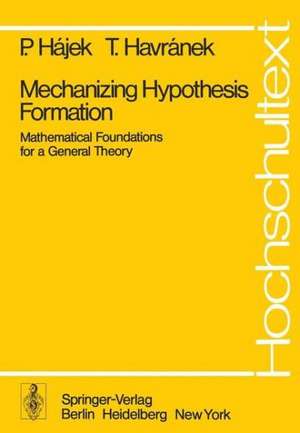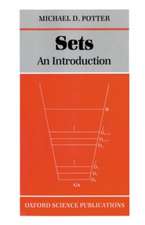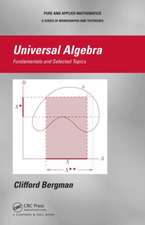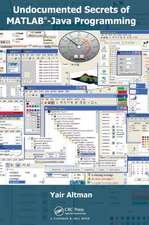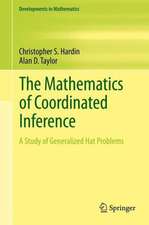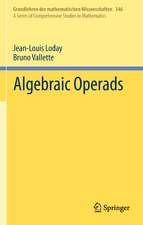Mechanizing Hypothesis Formation: Mathematical Foundations for a General Theory: Universitext
Autor P. Hajek, T. Havraneken Limba Engleză Paperback – apr 1978
Din seria Universitext
- 13%
 Preț: 353.49 lei
Preț: 353.49 lei -
 Preț: 487.96 lei
Preț: 487.96 lei - 15%
 Preț: 543.75 lei
Preț: 543.75 lei -
 Preț: 418.67 lei
Preț: 418.67 lei - 20%
 Preț: 628.22 lei
Preț: 628.22 lei -
 Preț: 322.62 lei
Preț: 322.62 lei - 17%
 Preț: 364.82 lei
Preț: 364.82 lei -
 Preț: 634.38 lei
Preț: 634.38 lei - 17%
 Preț: 427.32 lei
Preț: 427.32 lei - 13%
 Preț: 355.52 lei
Preț: 355.52 lei - 17%
 Preț: 431.50 lei
Preț: 431.50 lei - 19%
 Preț: 429.21 lei
Preț: 429.21 lei - 19%
 Preț: 393.95 lei
Preț: 393.95 lei -
 Preț: 360.08 lei
Preț: 360.08 lei -
 Preț: 358.44 lei
Preț: 358.44 lei - 13%
 Preț: 389.95 lei
Preț: 389.95 lei -
 Preț: 465.61 lei
Preț: 465.61 lei -
 Preț: 371.99 lei
Preț: 371.99 lei - 15%
 Preț: 497.22 lei
Preț: 497.22 lei - 15%
 Preț: 737.46 lei
Preț: 737.46 lei - 17%
 Preț: 394.41 lei
Preț: 394.41 lei - 15%
 Preț: 509.58 lei
Preț: 509.58 lei - 17%
 Preț: 427.68 lei
Preț: 427.68 lei - 8%
 Preț: 495.44 lei
Preț: 495.44 lei - 17%
 Preț: 364.57 lei
Preț: 364.57 lei - 17%
 Preț: 369.08 lei
Preț: 369.08 lei -
 Preț: 396.55 lei
Preț: 396.55 lei - 15%
 Preț: 553.33 lei
Preț: 553.33 lei - 17%
 Preț: 365.35 lei
Preț: 365.35 lei -
 Preț: 356.78 lei
Preț: 356.78 lei -
 Preț: 673.45 lei
Preț: 673.45 lei - 17%
 Preț: 426.76 lei
Preț: 426.76 lei - 20%
 Preț: 569.56 lei
Preț: 569.56 lei -
 Preț: 372.87 lei
Preț: 372.87 lei -
 Preț: 319.07 lei
Preț: 319.07 lei -
 Preț: 379.86 lei
Preț: 379.86 lei -
 Preț: 445.88 lei
Preț: 445.88 lei -
 Preț: 382.36 lei
Preț: 382.36 lei - 15%
 Preț: 533.72 lei
Preț: 533.72 lei - 15%
 Preț: 496.02 lei
Preț: 496.02 lei - 15%
 Preț: 474.82 lei
Preț: 474.82 lei -
 Preț: 389.70 lei
Preț: 389.70 lei -
 Preț: 484.08 lei
Preț: 484.08 lei - 15%
 Preț: 643.48 lei
Preț: 643.48 lei -
 Preț: 415.02 lei
Preț: 415.02 lei - 15%
 Preț: 602.25 lei
Preț: 602.25 lei - 20%
 Preț: 510.24 lei
Preț: 510.24 lei - 15%
 Preț: 588.37 lei
Preț: 588.37 lei -
 Preț: 381.59 lei
Preț: 381.59 lei
Preț: 398.53 lei
Nou
Puncte Express: 598
Preț estimativ în valută:
76.26€ • 83.09$ • 64.26£
76.26€ • 83.09$ • 64.26£
Carte tipărită la comandă
Livrare economică 23 aprilie-07 mai
Preluare comenzi: 021 569.72.76
Specificații
ISBN-13: 9783540087380
ISBN-10: 3540087389
Pagini: 416
Ilustrații: XVI, 398 p.
Dimensiuni: 170 x 244 x 22 mm
Greutate: 0.66 kg
Ediția:Softcover reprint of the original 1st ed. 1978
Editura: Springer Berlin, Heidelberg
Colecția Springer
Seria Universitext
Locul publicării:Berlin, Heidelberg, Germany
ISBN-10: 3540087389
Pagini: 416
Ilustrații: XVI, 398 p.
Dimensiuni: 170 x 244 x 22 mm
Greutate: 0.66 kg
Ediția:Softcover reprint of the original 1st ed. 1978
Editura: Springer Berlin, Heidelberg
Colecția Springer
Seria Universitext
Locul publicării:Berlin, Heidelberg, Germany
Public țintă
ResearchCuprins
Introduction: What is a Logic of Discovery.- I. Introduction: What is a Logic of Discovery.- A. A Logic of Induction.- II. A Formalization of Observational and Theoretical Languages.- III. The Logic of Observational Functor Calculi.- IV. Logical Foundations of Computational Statistics.- V. Rank Calculi.- B. A Logic of Suggestion.- VI. Listing of Important Observational Statements and Related Logical Problems.- VII. A General Guha-Method with Associational Quantifiers.- VIII. Further Statistical Problems of the Logic of Discovery.- Postcript: Some Remarks on the History of the Guha Method and its Logic of Discovery.
